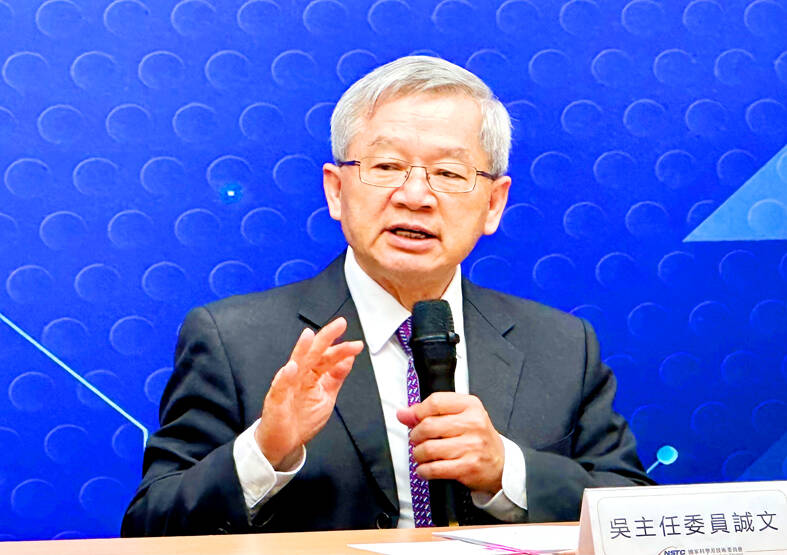Taiwan’s semiconductor ecosystem is “irreplaceable,” even though the US-China tech dispute might escalate, a National Science and Technology Council (NSTC) executive said yesterday, adding the council has proposed a record-high annual budget of NT$159.6 billion for next year to bolster the nation’s technological development.
Taiwan’s semiconductor industry ecosystem, which was first developed about 40 years ago, is “irreplaceable and not easy to replicate,” said NSTC Deputy Minister Su Chen-kang (蘇振綱) yesterday, who oversaw the Southern Taiwan Science Park (南部科學園區) achieve an output of more than NT$1 trillion (US$30.67 billion) for three consecutive years during his term as the science park’s director-general.
Cutting-edge industries and influential global companies would continue to invest in Taiwan and the nation’s science parks would continue to expand to meet the substantial industrial needs, he said.

Photo :CNA
Su told reporters that he would rather not speak on behalf of the NSTC, when asked about former US president and Republican Party presidential candidate Donald Trump’s comments that Taiwan “should pay” the US for protecting Taiwan’s chip business.
Trump’s comments have caused concerns that his victory in November’s US presidential election could exacerbate the US-China tech dispute, affecting Taiwanese vendors’ investments or restricting US vendors’ access to Taiwan.
However, Su said the Taiwanese government is dedicated to constructing an investor-friendly environment to attract global vendors to invest in new plants in the science parks and bring about benefits for the sector.
Although the semiconductor stocks plummeted yesterday, Su said that Taiwan’s comprehensive semiconductor ecosystem still has a relative advantage regarding the medium to long-term industrial development.
While Taiwan plays a key role in AI development, digital transformation and net zero transformation, NSTC would continue to reinforce its science parks to support the nation’s industries, he said, adding that the government is planning to establish overseas science parks as well.
Meanwhile, the council on Wednesday proposed a record-high annual budget of NT$159.6 billion for next year to bolster the nation’s technological development.
The NSTC made public the budget agreed by its committee (comprised of eight ministerial-level heads, academics and industry representatives), which totaled NT$159.6 billion. This represented a 15 percent rise from last year and a 1.6 percent increase from this year.
NSTC Minister Wu Cheng-wen (吳誠文) said the budget is intended to implement what President William Lai (賴清德) envisioned in his inaugural speech, namely transforming Taiwan into an artificial intelligence island.
Wu said that helping industries make digital and net-zero transitions, balancing the country’s development, strengthening communication resilience and developing smart medical services are among the focuses of the AI-centered plan.
“The aim is to solve social problems and provide social needs with new technologies, based on Taiwan’s comparative advantages in semiconductor and information and communication technologies,” NSTC Office of Science and Technology Policy Executive Secretary Yang Chia-lin (楊佳玲) said.
In addition to the “five trusted industry sectors” underlined by Lai — semiconductors, AI, military, security and surveillance, and next-generation communications (6G and communication satellites) — Yang said that other areas that would receive heavy investment include net-zero technologies, small and medium-sized enterprises and startups, and smart health.
The rough budget allocation — for certain key sectors — is NT$20 billion for semiconductors, NT$10 billion for AI, NT$9 billion for space and communications, and about NT$12 billion for net-zero technologies, Yang said, adding that these figures do not include investment in foundational research conducted by academia.
The budget proposal still has to be approved by the Executive Yuan.

Taiwan is stepping up plans to create self-sufficient supply chains for combat drones and increase foreign orders from the US to counter China’s numerical superiority, a defense official said on Saturday. Commenting on condition of anonymity, the official said the nation’s armed forces are in agreement with US Admiral Samuel Paparo’s assessment that Taiwan’s military must be prepared to turn the nation’s waters into a “hellscape” for the Chinese People’s Liberation Army (PLA). Paparo, the commander of the US Indo-Pacific Command, reiterated the concept during a Congressional hearing in Washington on Wednesday. He first coined the term in a security conference last

Prosecutors today declined to say who was questioned regarding alleged forgery on petitions to recall Democratic Progressive Party (DPP) legislators, after Chinese-language media earlier reported that members of the Chinese Nationalist Party (KMT) Youth League were brought in for questioning. The Ministry of Justice Investigation Bureau confirmed that two people had been questioned, but did not disclose any further information about the ongoing investigation. KMT Youth League members Lee Hsiao-liang (李孝亮) and Liu Szu-yin (劉思吟) — who are leading the effort to recall DPP caucus chief executive Rosalia Wu (吳思瑤) and Legislator Wu Pei-yi (吳沛憶) — both posted on Facebook saying: “I

The Ministry of Economic Affairs has fined Taobao NT$1.2 million (US$36,912) for advertisements that exceed its approved business scope, requiring the Chinese e-commerce platform to make corrections in the first half of this year or its license may be revoked. Lawmakers have called for stricter enforcement of Chinese e-commerce platforms and measures to prevent China from laundering its goods through Taiwan in response to US President Donald Trump’s heavy tariffs on China. The Legislative Yuan’s Finance Committee met today to discuss policies to prevent China from dumping goods in Taiwan, inviting government agencies to report. Democratic Progressive Party Legislator Kuo Kuo-wen (郭國文) said

The Ministry of Economic Affairs has fined Taobao NT$1.2 million (US$36,900) for advertisements that exceeded its approved business scope and ordered the Chinese e-commerce platform to make corrections in the first half of this year or its license would be revoked. Lawmakers have called for stricter supervision of Chinese e-commerce platforms and more stringent measures to prevent China from laundering its goods through Taiwan as US President Donald Trump’s administration cracks down on origin laundering. The legislature’s Finance Committee yesterday met to discuss policies to prevent China from dumping goods in Taiwan, inviting government agencies to report on the matter. Democratic Progressive Party